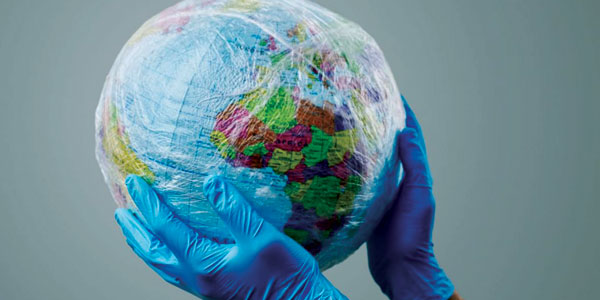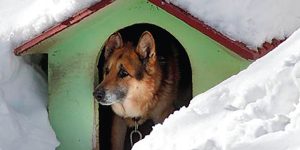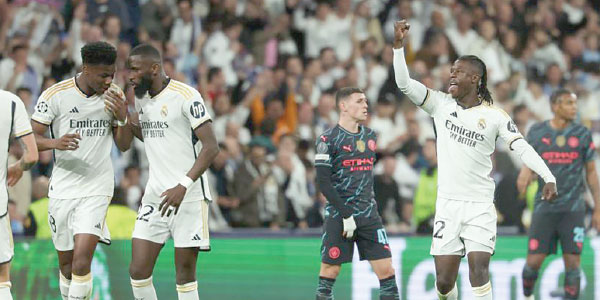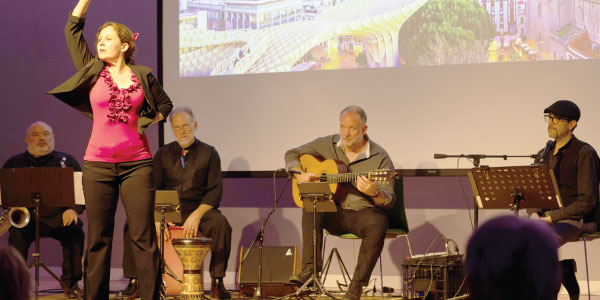
By Jorge Ramos
“Stop the world, I want to get off!” So goes the famous phrase often (though falsely) attributed to Mafalda, the little girl in the much-beloved Argentine comic strip of the same name published in the 1960s and ’70s.
When I first came upon the expression years ago, its naked absurdity made me laugh. Today, I feel differently. In 2020, the world has actually stopped. Yet sadly, the one thing we cannot do is disembark.
This is the only planet we have; there’s no Plan B. Our only hope, like that of any species, is to find a way to survive.
And survive we will. By next year, I hope, a vaccine and an effective treatment will be available to fight COVID-19, the disease caused by the new coronavirus. In the meantime, however, as French President Emmanuel Macron put it: “We are at war.”
German Chancellor Angela Merkel agrees: “Since the Second World War, there has been no challenge to our nation that has demanded such a degree of common and united action,” she has said.
This is the greatest crisis of our generation. We have never experienced anything like this.
Unfortunately, things are going to get worse before they get better. The number of COVID-19 cases and related deaths continues to rise around the world. And the terrible truth is that, due to limited testing in some countries, the real number of cases is likely far higher. Governments have simply been overwhelmed by the arrival of the virus.
The worst-case scenario projected by the U.S. Centers for Disease Control and Prevention in Atlanta is that, if no action is taken, between 160 million and 214 million Americans could become infected. The death toll could then be anywhere between 200,000 and 1.7 million people. However, there’s hope that the preventive steps taken by the United States and other nations will soon begin to make improvements.
Regardless, it’s clear that some of our leaders have not been up to the challenge. On Jan. 30, when there was still time to avoid an outbreak, President Donald Trump said: “We think we have it very well under control.” They didn’t. On Feb. 26, Trump wrongly insisted that “because of all we’ve done, the risk to the American people remains very low.” Weeks later, new cases are being reported every day.
The best advice I’ve heard for world leaders facing a pandemic comes from Dr. Michael Ryan, executive director of the World Health Organization’s Health Emergencies Program: “Be fast, have no regrets; you must be the first mover,” he said at a recent press briefing on the virus held in Geneva.
He continued: “If you need to be right before you move, you will never win. … Speed trumps perfection.
And the problem in society we have at the moment is everyone is afraid of making a mistake, everyone is afraid of the consequence of error. But the greatest error is not to move.”
Problems arise when politicians don’t even follow the advice of their own experts, behaving publicly in ways that set a poor example for everyone else. These days, such mistakes in leadership are measured in lives.
All sense of what is normal has disappeared in the blink of an eye. The most typical and human of our interactions — greeting and hugging and kissing one another; exercising in groups; eating together; having any fun with each other at all — are now discouraged and, in some cases, forbidden. Like millions of people around the world, I’ve been working from home recently. It’s the first time in decades that I don’t have any travel scheduled. All I want to do is get on a plane and fly to someplace — anyplace — where
things are normal. But those places can no longer be found.
I haven’t had this much time to spare since I was a child. Gone are my packed schedules, my days without enough hours in them. Now time passes slowly. I make up work itineraries for myself, but feel no pressure to follow them. I can have breakfast, or dinner, whenever I want.
I notice my children taking their online classes for school, and it breaks my heart: I know it will be a long those around me, but inside I’m full of doubt and uncertainty.
I confess that, as Pablo Neruda once put it, I’ve lived. I’ve reported on several wars and covered New York City on 9/11; those ghosts still haunt me — and all of us. But I’ve never experienced a sudden and deadly global health crisis like this one. We will bear its scars for the rest of our lives.
Who would have thought that the year 2019, as bumpy and challenging as it was, would turn out to have been a paradise compared to 2020? The future, if I’m being honest, doesn’t look good.
Surely, Mafalda would have wanted to get off this planet. It’s too bad that we can’t.
_________________________________________________________________________________
Y de pronto el mundo se detuvo…..
“¡Paren el mundo que me quiero bajar!”, dice una frase que falsamente se le ha atribuido a Mafalda, la
famosa niña de la tira cómica creada por Quino. Cuando la leí por primera vez, hace años, me daba risa por lo absurdo. Pero en este 2020 el mundo, de pronto, se paró. Y lo que no podemos hacer es bajarnos. Este es el único planeta que tenemos, no hay plan B y nuestro destino, como el de todas las especies, es buscar maneras de sobrevivir.
Y lo vamos a hacer. Para el próximo año, espero, habrá una vacuna y un tratamiento para el COVID-19, la enfermedad causada por el coronavirus descubierto recientemente. Mientras tanto, como lo dijo el presidente francés, Emmanuel Macron, “estamos en guerra”. La canciller alemana, Angela Merkel, aseguróque “desde la Segunda Guerra Mundial no ha existido un reto a nuestra nación que exija tales niveles de acción común y conjunta”.
Esta es la mayor crisis de nuestra generación. Nunca hemos vivido algo así.
Las cosas van a empeorar antes de mejorar. El número de casos y de fallecimientos por el COVID-19 a nivel mundial sigue aumentando. Lo más grave es que, por falta de pruebas en algunos países, los casos reales son muchos más que los reportados por los cautelosos y abrumados gobiernos. La crisis los ha sobrepasado.
La proyección más pesimista de los Centros para el Control de las Enfermedades (CDC, por su sigla en inglés) de Estados Unidos es que, si no se implementan acciones, podría haber entre 160 y 214 millones de estadounidenses que se contagiarían durante la epidemia, según reportó The New York Times. Y los muertos podrían ir de 200.000 a 1,7 millones de personas. Pero la esperanza es que las medidas tomadas en Estados Unidos y en otras naciones empiecen pronto a surgir efecto.
A pesar de todo, hay líderes que no han estado a la altura que requiere una emergencia como esta. Cuando todavía era posible evitar una ola de contagio, el 30 de enero, el presidente estadounidense dijo: “Tenemos todo bajo control”. “Por todo lo que hemos hecho, el riego para los estadounidenses es muy bajo”, insistió equivocadamente el 26 de febrero. Ahora ya es demasiado tarde y hay nuevos casos reportados cada día en Estados Unidos.
El mejor consejo que he escuchado para que los líderes del mundo que están enfrentando esta pandemia viene del doctor Michael Ryan, director ejecutivo del programa de emergencias sanitarias de la Organización Mundial de la Salud (OMS): “Actúa rápidamente, no te arrepientas; tienes que ser el primero en moverte”, dijo en una reciente rueda de prensa sobre el virus en Ginebra.
Continuó: “Si quieres estar seguro antes de mover, nunca vas a ganarle. […] La velocidad es mejor que la perfección. Y el problema que tenemos es que todos tienen miedo de cometer un error, todos tienen miedo de las consecuencias de un error. Pero el mayor error es no moverse”.
El verdadero problema es cuando los políticos no siguen los consejos de sus propios expertos. Y cuando su conducta pública no se puede presentar como un ejemplo para el resto de la población. Esos errores de liderazgo se miden en vidas.
Mientras tanto, ha desaparecido en un parpadeo cualquier idea de normalidad. Lo más humano —tocarse, saludarse, besarse, abrazarse, hacer ejercicio, reunirse, comer juntos, salir a divertirse— es poco aconsejable y, en algunos casos, hasta prohibido. Como millones de personas en el mundo que podemos hacerlo, llevo dos semanas trabajando desde casa y por primera vez en décadas no tengo viajes pendientes.
Dan ganas de subirse a un avión y bajarse en un sitio normal. Pero de esos ya no hay.
Por primera vez desde mi infancia, me sobra tiempo. Atrás quedaron las agendas repletas y los días que no alcanzan. Ahora las horas pasan lentamente. Me invento horarios que no tengo que seguir porque el desayuno y la cena pueden ser en cualquier momento. Veo a los niños en sus clases virtuales y se me rompe el corazón porque sé que tendrá que pasar mucho tiempo antes que regresen a la escuela y vuelvan a jugar en persona con sus amigos. Y trato de proyectarle a los míos una sensación de seguridad a pesar de que, por dentro, estoy lleno de dudas e incertidumbre.
Confieso —gracias, Neruda— que he vivido. He reportado sobre varias guerras y cubrí en Nueva York los actos terroristas del 9/11; sus fantasmas todavía nos persiguen. Pero nunca me había tocado ser parte de una súbita y mortífera crisis global de salud como esta. Llevaremos sus cicatrices por el resto de nuestras vidas.
¿Quién iba a pensar que 2019, un año duro y complicado, sería el paraíso? El futuro, a secas, no pinta bien. Por eso hasta Mafalda hubiera querido brincar del mundo.









